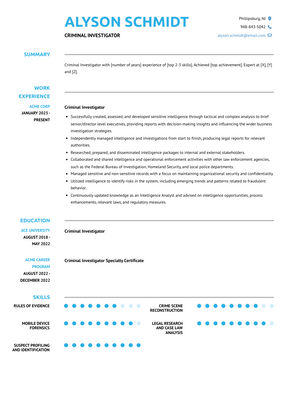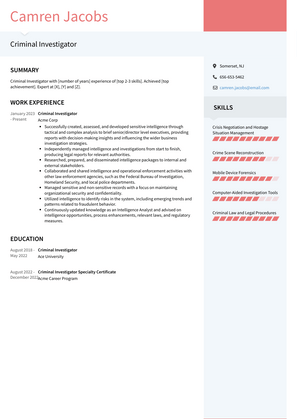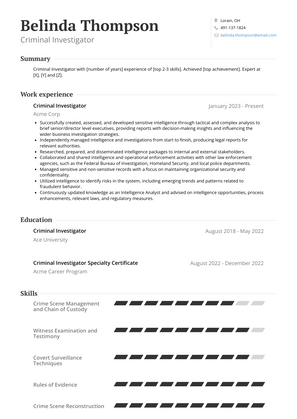Criminal Investigator Resume Examples and Templates
This page provides you with Criminal Investigator resume samples to use to create your own resume with our easy-to-use resume builder. Below you'll find our how-to section that will guide you through each section of a Criminal Investigator resume.



What Do Hiring Managers Look for in a Criminal Investigator Resume
- Attention to detail for thorough analysis of crime scenes and evidence.
- Analytical and critical thinking skills to connect evidence and draw conclusions.
- Strong communication and interpersonal skills for effective interviews and collaboration.
- Persistence and determination to follow leads and solve complex cases.
- Ethical conduct and integrity in handling evidence and upholding the law.
How to Write a Criminal Investigator Resume?
To write a professional Criminal Investigator resume, follow these steps:
- Select the right Criminal Investigator resume template.
- Write a professional summary at the top explaining your Criminal Investigator’s experience and achievements.
- Follow the STAR method while writing your Criminal Investigator resume’s work experience. Show what you were responsible for and what you achieved as a Criminal Investigator.
- List your top Criminal Investigator skills in a separate skills section.
How to Write Your Criminal Investigator Resume Header?
Write the perfect Criminal Investigator resume header by:
- Adding your full name at the top of the header.
- Add a photo to your resume if you are applying for jobs outside of the US. For applying to jobs within the US, avoid adding photo to your resume header.
- Add your current job title as a Criminal Investigator to the header to show relevance.
- Add your current city, your phone number and a professional email address.
- Finally, add a link to your portfolio to the Criminal Investigator resume header. If there’s no portfolio link to add, consider adding a link to your LinkedIn profile instead.
Bad Criminal Investigator Resume Example - Header Section
Deon 35 Marshall Drive Chardon, OH 44024 Marital Status: Married, email: cooldude2022@gmail.com
Good Criminal Investigator Resume Example - Header Section
Deon Nguyen, Chardon, OH, Phone number: +1-555-555-5555, Link: linkedin/in/johndoe
Make sure to add a professional looking email address while writing your resume header. Let’s assume your name is John Doe - here is a formula you can use to create email addresses:
- firstnamelastname@email.com - johndoe@email.com
- firstname.lastname@email.com - john.doe@email.com
- lastname.firstname@email.com - doe.john@email.com
- f.lastname@email.com - j.doe@email.com
- l.firstname@email.com - d.john@email.com
- firstnamelastname12@email.com - johndoe12@email.com
For a Criminal Investigator email, we recommend you either go with a custom domain name (john@johndoe.com) or select a very reputed email provider (Gmail or Outlook).
How to Write a Professional Criminal Investigator Resume Summary?
Use this template to write the best Criminal Investigator resume summary: Criminal Investigator with [number of years] experience of [top 2-3 skills]. Achieved [top achievement]. Expert at [X], [Y] and [Z].
How to Write a Criminal Investigator Resume Experience Section?
Here’s how you can write a job winning Criminal Investigator resume experience section:
- Write your Criminal Investigator work experience in a reverse chronological order.
- Use bullets instead of paragraphs to explain your Criminal Investigator work experience.
- While describing your work experience focus on highlighting what you did and the impact you made (you can use numbers to describe your success as a Criminal Investigator).
- Use action verbs in your bullet points.
Criminal Investigator Resume Example
Criminal Investigator
- Successfully created, assessed, and developed sensitive intelligence through tactical and complex analysis to brief senior/director level executives, providing reports with decision-making insights and influencing the wider business investigation strategies.
- Independently managed intelligence and investigations from start to finish, producing legal reports for relevant authorities.
- Researched, prepared, and disseminated intelligence packages to internal and external stakeholders.
- Collaborated and shared intelligence and operational enforcement activities with other law enforcement agencies, such as the Federal Bureau of Investigation, Homeland Security, and local police departments.
- Managed sensitive and non-sensitive records with a focus on maintaining organizational security and confidentiality.
- Utilized intelligence to identify risks in the system, including emerging trends and patterns related to fraudulent behavior.
- Continuously updated knowledge as an Intelligence Analyst and advised on intelligence opportunities, process enhancements, relevant laws, and regulatory measures.
Top Criminal Investigator Resume Skills for 2023
- Crime Scene Investigation Techniques
- Evidence Collection and Preservation
- Forensic Science and Analysis
- Interviewing and Interrogation Techniques
- Surveillance and Stakeout Operations
- Witness Examination and Testimony
- Criminal Profiling and Behavioral Analysis
- Criminal Law and Legal Procedures
- Search and Seizure Laws
- Rules of Evidence
- Crime Scene Reconstruction
- Crime Mapping and Data Analysis
- Firearms and Ballistics Analysis
- DNA Analysis and Forensic Genetics
- Fingerprint Analysis and Identification
- Digital Forensics and Cybercrime Investigation
- Undercover Operations
- Polygraph Testing and Analysis
- Covert Surveillance Techniques
- Criminal Intelligence Gathering
- Financial Investigations and Fraud Examination
- Crime Prevention and Community Policing
- Crime Analysis and Pattern Recognition
- Interagency Collaboration and Task Force Operations
- Report Writing and Documentation
- Witness Protection and Confidential Informants
- Interviewing Techniques for Vulnerable Populations
- Crime Scene Photography and Videography
- Computer-Aided Investigation Tools
- Mobile Device Forensics
- Criminal Investigation Ethics and Professionalism
- Courtroom Presentation and Testimony
- Crime Scene Reconstruction
- Criminal Investigation Planning and Execution
- Suspect Profiling and Identification
- Surveillance Technology and Equipment
- Interview and Interrogation Recording and Analysis
- Crime Analysis Software and Tools
- Crime Scene Management and Chain of Custody
- Investigative Report Review and Analysis
- Legal Research and Case Law Analysis
- Search Warrant Preparation and Execution
- Crime Scene Sketching and Diagramming
- Crime Analysis and Trend Identification
- Undercover Operation Planning and Execution
- Covert Listening and Surveillance Equipment
- Crisis Negotiation and Hostage Situation Management
- Criminal Investigation Strategies and Tactics
How Long Should my Criminal Investigator Resume be?
Your Criminal Investigator resume length should be less than one or two pages maximum. Unless you have more than 25 years of experience, any resume that’s more than two pages would appear to be too long and risk getting rejected.
On an average, for Criminal Investigator, we see most resumes have a length of 2. And, that’s why we advise you to keep the resume length appropriate to not get rejected.
Copyright ©2025 Workstory Inc.
